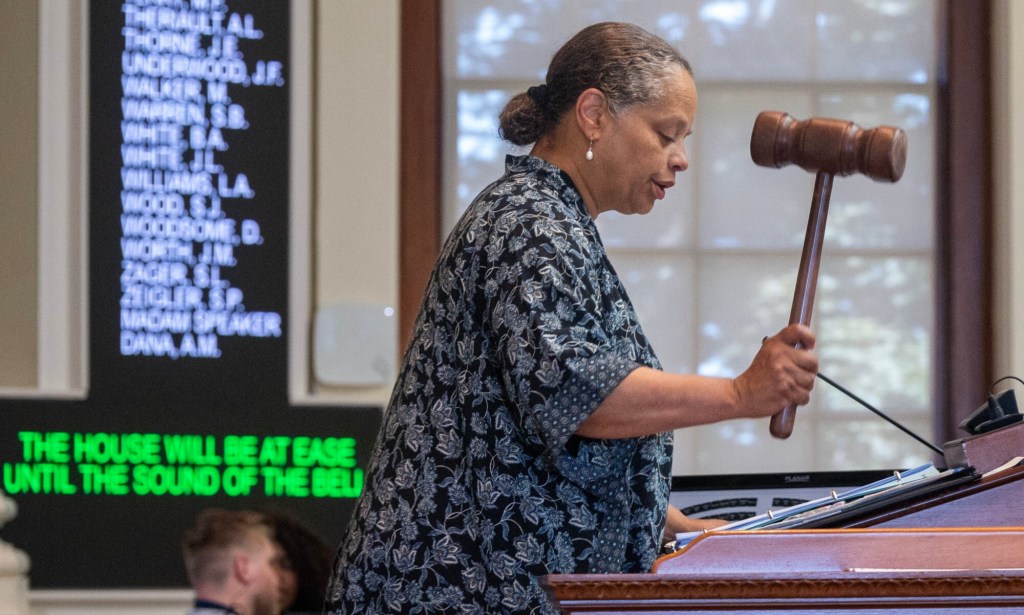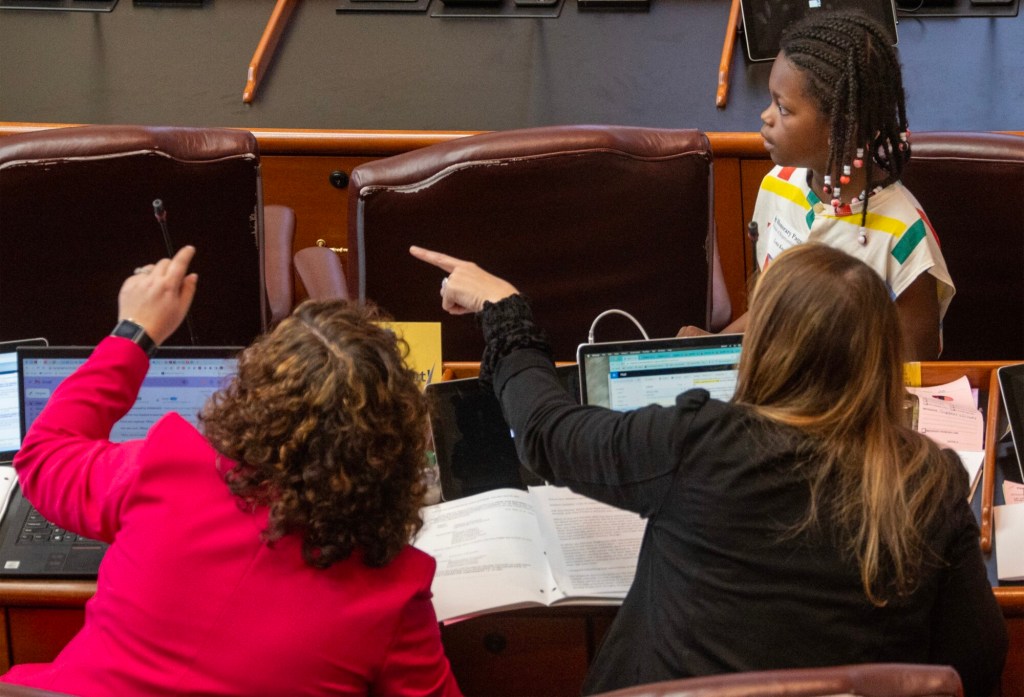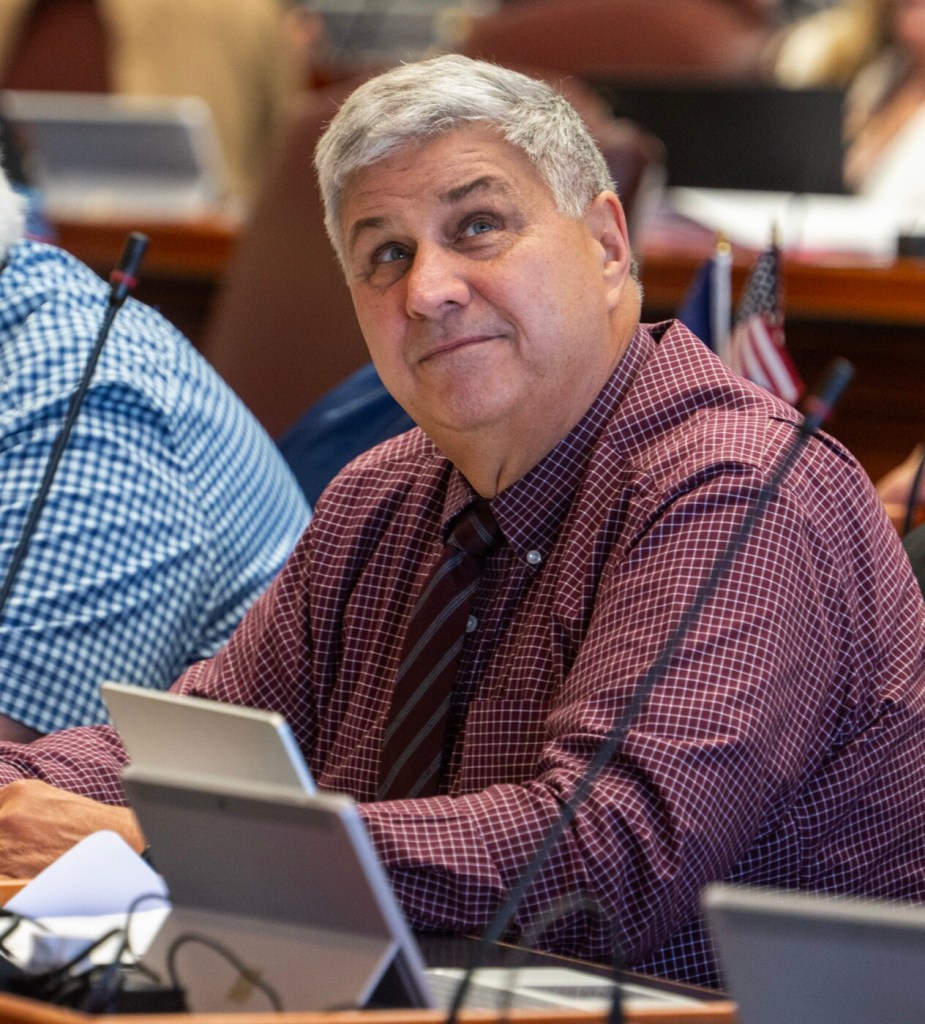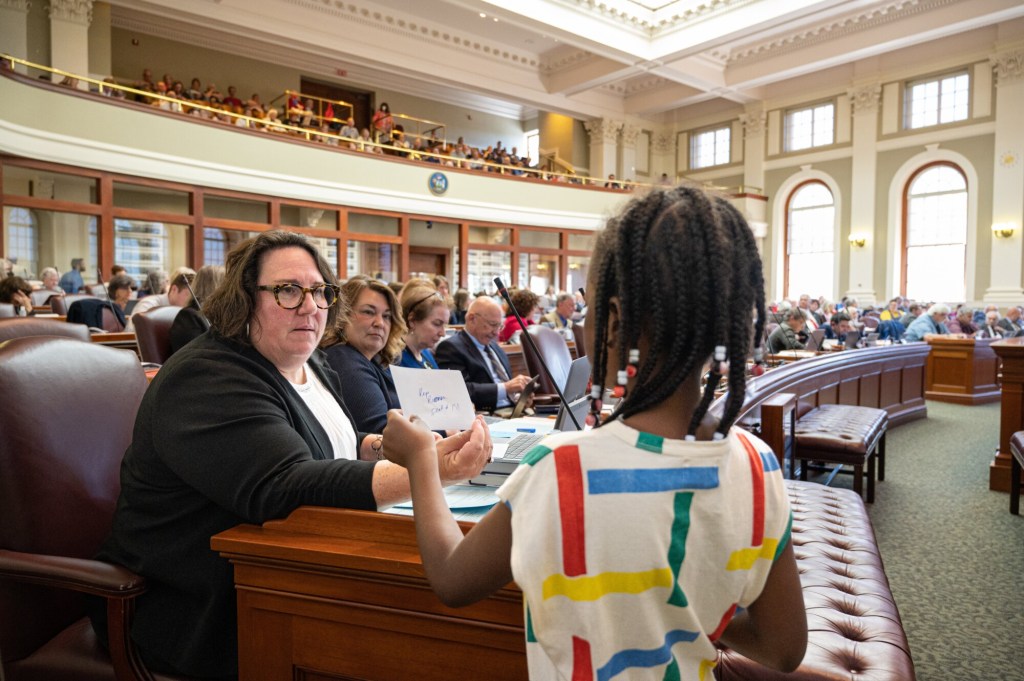AUGUSTA — The Maine House of Representatives voted 74-72 late Thursday night to advance Gov. Janet Mills’ bill to expand access to post-viability abortions, with majority Democrats holding together barely enough support after a four-hour recess to count votes and consider a last-minute compromise.
One Democratic lawmaker rushed to the State House late Thursday from Deer Isle, a two-hour drive, to help shore up support before lawmakers reconvened shortly before 10 p.m. The vote began about 30 minutes later after a final appeal from Republican and Democratic opponents as activists for and against the bill filled the balcony and the hallway outside the House chamber.
An amendment proposed late in the afternoon by Rep. Ben Collings, D-Portland, would have limited the scope to allow abortions after 24 weeks if the fetus is diagnosed with a lethal anomaly reasonably likely to cause its death within three months of birth or the mother is a minor and the victim of rape or incest.
Maine’s existing abortion law allows for post-viability abortions if the mother’s life or health is at risk.
Collings’ amendment appeared to fail amidst a string of parliamentary votes just before midnight despite a plea from House Minority Leader Billy Bob Faulkingham, R-Winter Harbor, to refer the bill back to the Judiciary Committee for consideration of what he called “reasonable amendments.”
“This bill has already torn us apart,” Faulkingham told House Speaker Rachel Talbot Ross, D-Portland, with whom he has built an amicable relationship. “It has not just torn both sides of the aisle apart, but it has torn your caucus apart. … Let’s not let this be the ruin of all the work we’ve done.”
As night turned into day, however, even Republicans began to balk at the GOP leadership’s effort to stop the House from taking its official vote to engross the bill, which is political phrasing for the first vote on a bill in either chamber.
“What I’m witnessing at this time of night is not becoming to a body that we respect,” said Rep. Gary Drinkwater, R-Milford, who voted against the bill. “We lost. That side won. We’ll get another bite at the apple. I think it’s time.”
Drinkwater said Republicans were upset about the Democrats calling for a half-hour break at 5 p.m., supposedly to discuss amendments, that turned into a four-hour break in which they summoned bill supporters to the Capitol to secure a victory. But he urged Republicans to take the high road.
“Let’s come back tomorrow and fight another day,” Drinkwater said just before 1 a.m.
The original bill allows abortions with a licensed doctor’s approval after the 24-week window, which is typically when a fetus becomes viable outside the womb, without specific restrictions. Supporters say such medical decisions are best left to a woman and her medical provider and shouldn’t be legislated.
Supporters had previously resisted efforts to narrow the scope of the bill to apply to cases of lethal fetal anomalies or rape or incest because they said legislation can never account for every pregnancy crisis or keep up with rapidly evolving fields of medicine.
But opponents say the original bill opens the door to abortions of healthy post-viability fetuses. Without specific limits, it relies on a doctor’s adherence to a medical standard of care upheld by his or her peers to avoid professional discipline, malpractice lawsuits, and criminal penalties.
If that bill is adopted, Maine would have one of the most progressive abortion laws in the country. Even if Collings’ amendment is added, Maine would become one of 19 states to legalize later-in-pregnancy abortions if a fetus is diagnosed with a fatal anomaly or in the case of rape or incest.
EMOTIONAL DEBATE
The hourlong debate on the House floor focused on whether the bill that Mills had introduced to help Maine women whose pregnancy dreams are shattered by lethal fetal anomalies would open the door to abortions of healthy post-viability fetuses.
“Some have said that this bill would result in countless abortions later in pregnancy,” said a tearful Rep. Amy Kuhn, D-Falmouth, who is a member of the Judiciary Committee that heard 19 hours of testimony on the bill. “I just don’t believe that. I trust women and I trust their providers.”
Kuhn said that as a lawmaker she didn’t think she was in a better position than a pregnant woman and her doctor to decide how best to handle a crisis pregnancy. Every pregnancy is different, she said, and every pregnancy crisis is a crisis.
A doctor that performs an unnecessary abortion would be breaking this law, would violate the standards of care required to keep their medical license and avoid malpractice lawsuits, and be subject to both civil and criminal penalties, said Rep. Adam Lee, D-Auburn, who is also a Judiciary Committee member.
“Absolutely nobody in this house wants to permit a healthy fetus in the womb of a healthy adult mother to be aborted,” Lee said. If that happens, “one can bring a complaint to the Maine Board of (Licensure). That’s the process. That’s how we determine what is and isn’t acceptable in the state.”
Opponents say the bill lacks the safeguards needed to protect healthy fetuses from imperfect physicians.
“I assume that you want to do the right thing,” said Assistant House Minority Leader Amy Arata, R-New Gloucester. “This bill was supposed to solve the tragic problem of a woman carrying a dead or dying baby. But abortions of non-viable babies are already legal.”
Current law only limits abortion of viable babies beyond 24 weeks, Arata said. She pointed to documents from the Maine Attorney General’s Office that used to say that but have since been pulled from the state website. This bill isn’t necessary if all Mills wants to do is end the suffering of doomed fetuses, she said.
But instead this bill, as written, would allow for the slow, painful death of healthy fetuses, Arata said. She urged Democrats to buck their party, and their governor, and stand up for those who do not have a voice, the healthy fetuses that could be carried successfully to term but could be aborted if this law passes.
She told bill supporters: “If this seems fair to you, I just don’t understand how a heart can grow so cold.”
The emotional debate played out in front of a gallery filled with spectators who clasped hands, crucifixes and beads in prayer. Outside, in the hall, people held signs. Inside the chamber, many lawmakers simply hung their heads, looking dejected as their colleagues shared personal stories of loss.
BILL TABLED
After about an hour of debate, Collings stood up and asked to table the bill until later in the session. That is when his proposed amendment to limit the scope of the bill was posted online. Collings didn’t respond to texts and calls seeking comment on his proposed amendment.
It was a sharp turnaround from earlier in the session when L.D. 1619 appeared to have garnered enough support from co-sponsors in both the House and Senate to assure its passage. But on Thursday, after an hour-and-a-half in caucus, Democratic leaders appeared in need of every vote they could find.
At about 7 p.m., House Majority Leader Mo Terry, D-Gorham, texted Rep. Holly Eaton, D-Deer Isle, for help. The first-term lawmaker campaigned as an abortion rights supporter and planned to vote for L.D. 1619, but couldn’t find childcare for her two children on Thursday.
“She asked if there was any way I could load the kids up and drive to Augusta because they needed my vote,” Eaton said from her car at about 9 p.m. as she parked outside the Capitol. “I said, ‘Absolutely, we will be there in two hours.’ They’re getting all of us, my 7-year-old and my youngest, who just turned 4.”
Eaton said she had been following House debate online while she was feeding her boys pizza for dinner.
The House finally voted on the matter just before 10:30 p.m. Lawmakers and those who remained in the gallery watched as votes cast showed up on the digital boards that hang in the chamber, watching for the long-awaited outcome to be known. The announcement of the 74-72 vote was met largely with silence.
Faulkingham struggled to come up with words to respond to the loss. “The stench in this building is overwhelming,” Faulkingham said before he sought out an adjournment with no discussion of Collings’ proposed amendment. His motion was denied.
After the vote, however, Collings made a motion to strip the Judiciary Committee amendment that had added the “standard of care” clause to Mills’ original bill, saying he wanted to replace that amendment with his own. Collings’ motion to reconsider the House amendment failed 68-77.
Planned Parenthood of Northern New England celebrated the House vote Thursday as a sign of trust in pregnant people and their doctors to make complex, deeply private medical decisions without political interference.
“We are proud of the reproductive rights champions who listened to their constituents and to medical providers and patient advocates, recognized the harms caused by our current law, and acted in the best interests of all Mainers today,” said interim CEO Nicole Clegg.
“The majority vote sent a clear message: Maine values reproductive freedom,” Clegg said in a statement issued minutes after the vote. “Maine trusts doctors and patients. Maine will not succumb to politically motivated attacks or dangerous, stigmatizing rhetoric.”
The bill now heads to the Senate, where 20 of the chamber’s 35 members have already signed on as co-sponsors. If that majority holds, and all the co-sponsors remain steadfast, this bill will head to Mills for likely approval. On the House side, the bill started with 75 co-sponsors but only drew 74 total votes.
The House Democrats who voted against the bill included: William Bridgeo of Augusta, Michel Lajoie of Lewiston, Kevin O’Connell of Brewer, Joe Perry of Bangor, and Bruce White of Waterville. Mana Abdi of Lewiston, Chris Kessler of South Portland and Anne Perry of Calais were absent.
No Republicans broke ranks, but Shelley Rudnicki of Fairfield and Kathy Javner of Chester were absent.
Some House co-sponsors strayed from their initial path. Rep. Walter Riseman, I-Harrison, had signed on to the bill as a co-sponsor. He said he had heard from countless constituents who opposed the bill. In his floor speech, the retired accountant called the proposal a failure.
“Should we be involved in this legislation?” Riseman asked. “My answer to that is: we don’t belong here, doing this. The law that’s in effect right now, it’s very baseline, very effective, and it’s doing its job. Let’s stop now before we get in too deep.”

Representatives walk down the hallway toward the House chamber past people carrying signs opposing L.D. 1619, “An Act to Improve Maine’s Reproductive Privacy Laws,” on Thursday at the Maine State House in Augusta. The third floor hallway was lined with people holding signs for and against the the bill. Joe Phelan/Kennebec Journal
However, several members of both the House and the Senate have come out since the Mills first put out the bill to say that they would have co-sponsored the bill if they had been asked to do so. Some said they couldn’t find the time to sit down with the sponsor to discuss it before the signature deadline had passed.
Mills has positioned herself as a defender of abortion rights when she was attorney general, on the campaign trail and in the wake of the U.S. Supreme Court decision to overturn Roe v. Wade. If enacted, Maine would become the eighth state or federal district to allow for later-in-pregnancy abortions.
Republicans claim the bill is extreme, allowing abortions up to birth without any limits on when an abortion can be performed on a viable fetus. They say most Mainers oppose it, noting the hundreds of anti-abortion advocates who packed the 19-hour public hearing on the bill last month.
The bill is one of the highest-profile measures heard by the Legislature this year. Earlier this week, the Legislature sent other bills to Mills to eliminate abortion insurance co-payments, ban local preemption of state abortion laws and protect providers who treat patients from states with abortion bans.
According to the Kaiser Family Foundation, the original bill puts Maine in the same group as Alaska, Colorado, New Jersey, New Mexico, Oregon, Vermont and Washington, D.C. Eight additional states allow post-viability abortions if conducted for lethal fetal anomalies.
Two other states allow post-viability abortions in cases of rape or incest, if a police report is filed. The amendment proposed by Collings doesn’t require a police report to verify that rape or incest occurred before a doctor can approve a post-viability abortion.
FEW SEEK POST-VIABILITY ABORTIONS
The number of people seeking abortions in Maine after the first trimester is small. In 2021, the most recent year data is available, 94% of the 1,905 abortions conducted in Maine were done within the first trimester of pregnancy, or up to 14 weeks. The remaining 107 occurred before 20 weeks.
Abortion-rights advocates note the chilling effect of Maine’s existing viability restrictions. The state law allows abortions for any reason through about 24 weeks, but doctors won’t do them after 20 weeks out of fear that imprecise gestational dating could lead to prosecution.
The number of women seeking post-viability abortions is very small – roughly 12 a year in Maine, according to Planned Parenthood of Northern New England – but research out of the University of California San Francisco shows that fetal anomaly is not the only reason women seek them.
According to a 2019 study out of the University of California San Francisco, the small group of abortions that take place after the first trimester happen because people get new information they didn’t have before or because of social, economic and logistical barriers to abortion care.
The research shows women seek later-in-pregnancy abortions when they learn of a fetal or maternal health issue, the loss of a job or spouse, and when they live in a state where abortion is illegal and must come up with the money and time off to travel to a state where abortion is legal.
Opponents argue that viable pregnancies should not be terminated for any reason other than the life or health of the mother or fetal anomalies that will result in the child’s imminent death before or shortly after birth. Efforts to modify the bill in committee to spell out these specific exemptions were rejected.
Advocates say such personal healthcare decisions are best left to a patient and their doctors, not lawmakers. To address such concerns, however, Rep. Matt Moonen, D-Portland, amended the bill in committee to require approving doctors must follow the medical standard of care.
The Maine Medical Association argues that state-appointed professional licensing boards are the best way to ensure that no Maine doctor is taking advantage of the proposed expansion in abortion access by performing medically unnecessary later-in-pregnancy abortions.
Such doctors would be subject to license suspension or revocation by a group of their peers working in the same medical field, as well as medical malpractice lawsuits that could result in large jury awards, according to the Maine Medical Association.
When the U.S. Supreme Court struck down Roe v. Wade last year, which essentially made abortion a state-controlled issue, about half of the U.S. states enacted or began discussing abortion bans. Dozens of states enacted additional abortion restrictions.
Mills campaigned for reelection on a promise to leave Maine’s strong 30-year-old abortion law intact. She changed her mind after hearing stories about Maine women like Dana Peirce of Yarmouth, who had to leave the state to get an abortion at 32 weeks after being diagnosed with a lethal fetal anomaly.
Opponents accuse Mills of reneging on her campaign pledge to leave the state abortion law alone. Mills called it a rational, compassionate proposal that would help people like Peirce but not open abortion floodgates. She said voters have always known she was an ardent abortion defender.
Staff Writer Randy Billings contributed to this report.
Send questions/comments to the editors.












